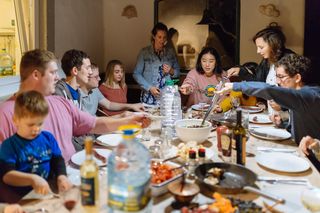Forgiveness
It’s About More Than Just Giving Thanks
Thanksgiving is a time to move past differences and re-connect.
Posted November 19, 2018

Thanksgiving is a day when we bring together the people that form our closest relationships, share a meal, and remind ourselves that we are grateful. It’s also a day when the children and teens sitting around the table learn about the centrality of family and friendships, respectful listening, and enthusiastic sharing. About gratitude, forgiveness, and empathy. It is a day when we hope that our teens, who are gaining increasing independence, learn to value intergenerational interdependence. Or not.
Children See, Children Do
Children pay close attention to our behavior. It helps them imagine what adulthood looks like. During adolescence, they gain a sense of urgency to figure out what it means to be a 25, 35, 45, or 75-year-old. They listen. They watch. They take it all in. Parents are teachers of values, ethics, and morals. When our words contradict what teens see and hear when we are not in “teacher mode” — that is when they are really listening.
Change the Behavior
Kids are witness to so much more than they have been in the past. Bad adult behavior. Tribalism. A lack of listening. A climate in which integrity is valued less than victory. The tone and tenor of too many adult conversations feel disrespectful. This is not who we should be. Yet it is what children see. We must not let it become their “normal.”
Teach This Lesson
We must convey to young people that the future will be built by well-worn paths between neighbors. By people who support each other, even if they don’t agree on every issue. And by diverse communities in which each person contributes to the greater good. Our different interests allow us to each fill a role that matches our talents. If we were all the same, life would be boring. Creative ideas would remain dormant. Connections would be stagnant.
Respect Differences
Use this Thanksgiving (and every other opportunity you can!!) to model for our children how to be adults. It is likely there’ll be people around the table who you cherish … but also find a bit annoying. Remember that the people who push your buttons are often those who have had the most influence over you. You may in the past have enjoyed discussions about politics. Your disagreements may have initiated, even enhanced, your connections. Now it seems different. The differences can feel so raw … so associated with divisiveness … so exploited for other’s gains. We’ve forgotten that families, kinship groups, and communities are the real “tribes” of the world. But we’ve always known that to prepare our children for the real world they had to increasingly respect different points of view – so that they could grow. Model how you appreciate differences of opinion. But remain steadfast in your values of acceptance, humanity, kindness, forgiveness.
Because we transmit our values to our children, how we choose to react to outward expressions of hatred or a lack of respect for others makes a difference. Try some simple words to make your values known while keeping the conversation from escalating. “I don’t agree with you on that point, but let’s use today to focus on things that bring us together as a family.”
Begin Healing
Take this opportunity as a do-over. Holidays such as Thanksgiving must remain times when families gather together, take stock of their lives, and re-connect. If we are to heal as a country, we must start in safe spaces. Our home. Communities. Within our families and kinships. We must model getting past differences as we celebrate shared interests. A first step might be forgiveness. Forgiveness does not mean forgetting. It means moving past feelings of anger or resentment and pursuing common ground to rebuild a positive relationship. It’s what allows us to restore the ability to see each other as we deserve to be seen ... as we really are. Through the lens of our commonality … not our differences.
This piece was co-authored by Eden Pontz, Executive Producer and Director of Digital Content, Center for Parent and Teen Communication.


